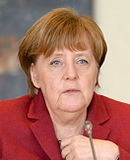Next German federal election
|
|
|||||||||||||||||||||||||||||||||||||||||||||||||||||
|---|---|---|---|---|---|---|---|---|---|---|---|---|---|---|---|---|---|---|---|---|---|---|---|---|---|---|---|---|---|---|---|---|---|---|---|---|---|---|---|---|---|---|---|---|---|---|---|---|---|---|---|---|---|
|
|||||||||||||||||||||||||||||||||||||||||||||||||||||
|
All 598+ seats in the Bundestag 300+ seats needed for a majority |
|||||||||||||||||||||||||||||||||||||||||||||||||||||
|
|||||||||||||||||||||||||||||||||||||||||||||||||||||
|
|||||||||||||||||||||||||||||||||||||||||||||||||||||
Federal elections will be held in Germany on 24 September 2017 to elect the members of the Bundestag.
At the previous federal election, in 2013, the incumbent government—composed of the Christian Democratic Union (CDU), the Christian Social Union (CSU, the CDU's Bavarian sister party), and the Free Democratic Party (FDP)—failed to achieve a majority of seats. The FDP failed to get over 5% of the vote, denying the party seats in the Bundestag for the first time in their history. In contrast, the CDU/CSU obtained their best result since 1990, with nearly 42% of the vote and just short of 50% of the seats. The CDU/CSU successfully negotiated with the Social Democrats (SPD) to form a grand coalition for the third time.
In March 2017, the SPD chose Martin Schulz, the former President of the European Parliament, as their leader and chancellor candidate. Since then support for the SPD has increased sharply.
German law requires that the Bundestag election shall take place on a Sunday between 46–48 months after the assembly's first sitting. Since the 18th Bundestag first sat on 22 October 2013, the latest date for the next election would have been 22 October 2017 and the earliest date 27 August 2017, the first Sunday after 22 August 2017. By convention, recent elections have been held in late September, avoiding the school holidays. Elections can be held earlier under certain conditions, such as the government losing a confidence motion.
...
Wikipedia






